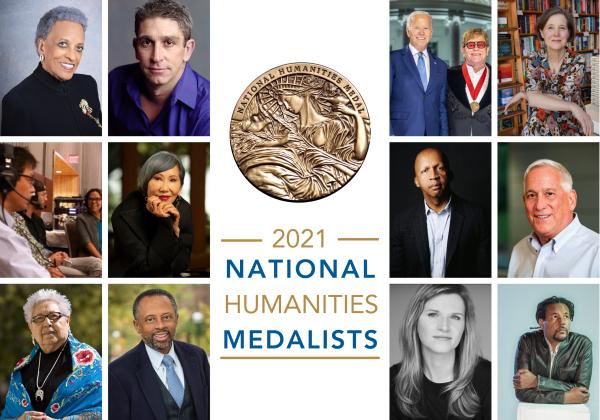President Biden Awards 2021 National Humanities Medals
Twelve distinguished humanists honored on March 21 in White House ceremony


President Joseph R. Biden presented the 2021 National Humanities Medals, in conjunction with the National Medals of Arts, yesterday, March 21, 2023, in an East Room ceremony at the White House. The 12 distinguished medal recipients include writers, historians, educators, and activists. First Lady Dr. Jill Biden attended the medals award ceremony.
“The National Humanities Medal recipients have enriched our world through writing that moves and inspires us; scholarship that enlarges our understanding of the past; and through their dedication to educating, informing, and giving voice to communities and histories often overlooked,” said NEH Chair Shelly C. Lowe (Navajo). “I am proud to join President Biden in recognizing these distinguished leaders for their outstanding contributions to our nation’s cultural life.”
The National Humanities Medal honors an individual or organization whose work has deepened the nation’s understanding of the human experience, broadened citizens’ engagement with history or literature, or helped preserve and expand Americans’ access to cultural resources.
Here are the 12 recipients of the 2021 National Humanities Medal, with their White House citations:
- Richard Blanco: An award-winning poet and author, professor and public speaker, and son of Cuban immigrants, Richard Blanco’s powerful storytelling challenges the boundaries of culture, gender, and class while celebrating the promise of our Nation’s highest ideals. (Read profile.)
- Johnnetta Betsch Cole: A scholar, anthropologist, and academic pace-setter, Johnnetta Betsch Cole’s pioneering work about the on-going contributions of Afro-Latin, Caribbean, and African communities have advanced American understanding of Black culture and the necessity and power of racial inclusion in our Nation. (Read profile.)
- Walter Isaacson: Through the stories of our Nation’s remarkable citizens, Walter Isaacson’s work, words, and wisdom bridge divides between science and the humanities and between opposing philosophies, elevating discourse and our understanding of who we are as a Nation. (Read profile.)
- Earl Lewis: As a social historian and academic leader, Earl Lewis has made vital contributions to the field of Black history, educating generations of students, while also being a leading voice for greater diversity in academia and our Nation. (Read profile.)
- Henrietta Mann: The pioneering efforts of Henrietta, Ho’oesto’oona'e, Mann, led to programs and institutions across the country devoted to the study of Native American history and culture, honoring ancestors that came before and benefiting generations that follow. (Read profile.)
- Ann Patchett: With her best-selling novels and essays, and her bookstore, readers from around the world see themselves in the pages of Ann Patchett’s books that take people to places of the heart and feed the imagination of our Nation. (Read profile.)
- Bryan Stevenson: An advocate fighting tirelessly for the poor, incarcerated, and condemned, Bryan Stevenson follows the Book of Micah’s instruction to act justly, love mercy, and walk humbly as he chronicles the legacy of lynching and racism in America, shining a light on what has been and all that we can be as a Nation. (Read profile.)
- Amy Tan: By bravely exploring experiences of immigrant families, heritage, memories, and poignant struggles, Amy Tan’s writing makes sense of the present through the past and adds ground-breaking narrative to the diverse sweep of American life and literature. (Read profile.)
- Tara Westover: Tara Westover’s memoirs of family, religion, and the transformative power of education, has moved millions of readers and served as a powerful example of how the humanities can set people—and a Nation—free. (Read profile.)
- Colson Whitehead: With genre-defying craftsmanship and creativity, Colson Whitehead’s celebrated novels make real the African American journey through our Nation’s continued reckoning with the original sin of slavery and our ongoing march toward a more perfect Union. (Read profile.)
- Native America Calling: Through its interactive shows on the radio and online, Native America Calling educates the American public about Indigenous issues while preserving Indigenous history and culture to honor their contributions that strengthen the sacred Nation-to-Nation relationship. (Read profile.)
- Sir Elton John*: An enduring icon and advocate with absolute courage, who found purpose to challenge convention, shatter stigma, and advance the simple truth that everyone deserves to be treated with dignity and respect. (Read profile.)
(*medal awarded separately in September 2022, during a White House event, “A Night When Hope and History Rhyme.”)
The first National Humanities Medal was awarded in 1996. Since then 206 medals have been bestowed—190 to individuals and 16 to organizations—inclusive of this year’s recipients. A complete set of previous honorees is available at this link.
The humanities medal was preceded by the Charles Frankel Prize, first awarded in 1989.
Join the conversation on Twitter at #ArtsHumanitiesMedal.
The 2021 National Medals of Arts were presented at the same ceremony. Among the recipients are Vera Wang, Jose Feliciano, Gladys Knight, and Julia Louis-Dreyfus.
Created in 1965 as an independent federal agency, the National Endowment for the Humanities (NEH) supports learning in history, literature, philosophy, and other areas of the humanities by funding selected, peer-reviewed proposals from around the nation that support research in the humanities, nurture humanities infrastructure, and expand the reach of the humanities. Since 1965, NEH has awarded nearly $6 billion to cultural institutions, individual scholars, and communities. The Endowment serves and strengthens the country by bringing high-quality historical and cultural experiences to large and diverse audiences in all 50 states, the District of Columbia, and five jurisdictions; providing opportunities for lifelong learning, access to cultural and educational resources, and strengthening the base of the human stories that connect all Americans.
National Endowment for the Humanities: Created in 1965 as an independent federal agency, the National Endowment for the Humanities supports research and learning in history, literature, philosophy, and other areas of the humanities by funding selected, peer-reviewed proposals from around the nation. Additional information about the National Endowment for the Humanities and its grant programs is available at neh.gov.